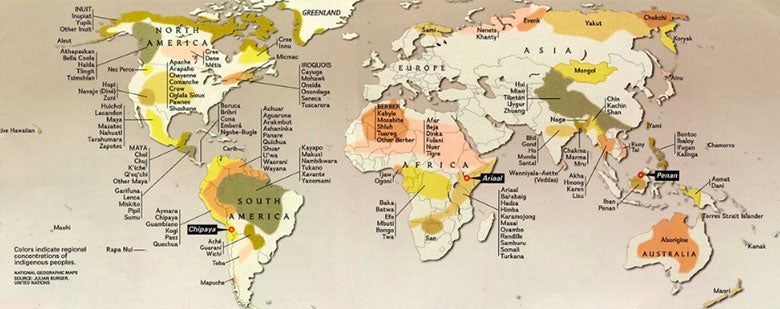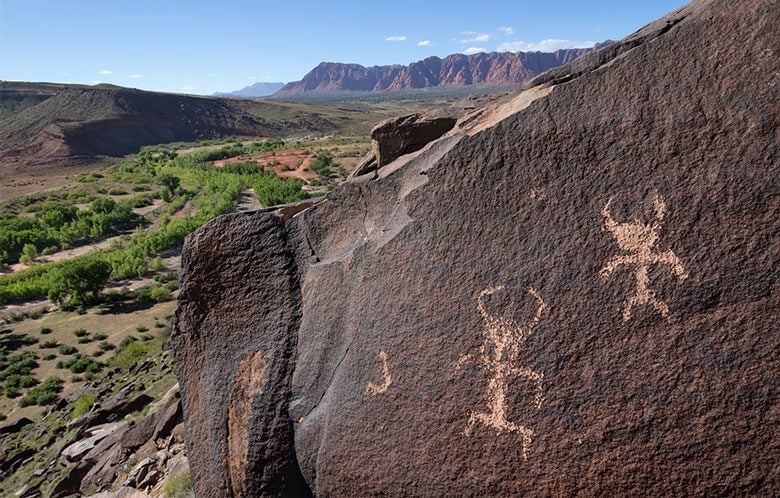Native people make up 5% of the world’s population with approximately 370 million people belonging to 5,000 different groups in 90 countries, according to the Cultural Survival Organization. Indigenous people have distinct populations and unique nations relative to the post-colonial culture of their countries. In fact, many still observe traditions and use languages influenced by their ancestral homelands.

Map of where Indigenous people are living today by Our Languages Matter.
What are Indigenous Studies?
Indigenous (Native American, American Indian, Aboriginal, First Nations) Studies are relatively new to universities and colleges, with the majority of programs introduced during the early 2000’s. This interdisciplinary academic field covers a variety of disciplines and examines the history, music, culture, politics, issues and contemporary experience of Native peoples around the world.
What types of programs are covered under this discipline?
Depending on location, laws, policies and cultural backgrounds, the programs that a university offers may be specialized for a specific country or region. However, programs typically cover these four specific areas outlined by Northern Arizona University:
- Tribal Policy, Politics & Administration
Most tribal communities operate separately from local, state or regional governments. Students acquire skills outside typical university study program areas such as education, government, political science and cultural studies. Understanding local and federal Indigenous policies and intergovernmental relations are necessary in order to effectively analyze and work within tribal governments. Students develop an in-depth knowledge of policies, treaty rights and the rights of Indigenous people under international laws to provide elected tribal officials with analytical insight into government and non-government organizations at the local, regional and national level.
- Environmental Science, Health and Management
Students build a thorough understanding of the distinct laws, policies and regulations of tribal and Indigenous lands and how they work with federal and international agencies such the Environmental Protection Agency, Indian Health Service or their counterparts in Canada, Australia, New Zealand and other countries with Indigenous populations. Students learn how to manage resources and engage communities with traditional knowledge by providing solutions to challenges with best practices and strategies that are culturally appropriate and effective.
- Cultural Resource Management and Expressive Culture
In these courses, students learn how to manage and protect culturally significant sites and resources of tribal nations within applicable laws, policies and regulations of local and international standards applicable to Indigenous peoples worldwide to ensure cultural continuity and sustainability. In addition, students develop an appreciation and understanding of the rich variety of cultural roots including music, film, dance, art, literature, language and spirituality.
- Sustainable Economic Development and Entrepreneurship
Students learn how to implement economic development strategies including Indigenous government entrepreneurship strategies, Indigenous community-based and owned enterprises, and programs that are culturally appropriate and feasible for Indigenous individuals, communities and nations. These types of strategies are typically ecologically sustainable and economically beneficial including programs such as renewable energy, ecotourism enterprises, sustainable agriculture and sustainable manufacturing. Students will be able to analyze the potential benefits of these critical areas, and design economic plans that drive regional economies.
We’re at this point in time in Canada, particularly following the Truth and Reconciliation Commission, where Canadians understand there’s been something structurally and terribly wrong with the relationship with indigenous peoples and we need to change it,” says Peggy Smith, an associate professor in the faculty of natural resources management at Lakehead University.
We’re at this point in time in Canada, particularly following the Truth and Reconciliation Commission, where Canadians understand there’s been something structurally and terribly wrong with the relationship with indigenous peoples and we need to change it,” says Peggy Smith, an associate professor in the faculty of natural resources management at Lakehead University.
What can graduates do with an Indigenous Studies degree?
Coursework in Indigenous Studies provide useful background for several job areas after graduation. Graduates may find they qualify for relevant positions in many areas, such as:
- Community action work
- Lobbyist
- Public administration (tribal or state relations, nonprofit management, education administration, planner)
- Public Health
- Political Aide or Researcher
- Political Analyst
- Social Work
- The arts
- Tribal employment (political office, tribal management, cultural resource programming, grant writer, cultural specialist, youth services)
- Indigenous Law
